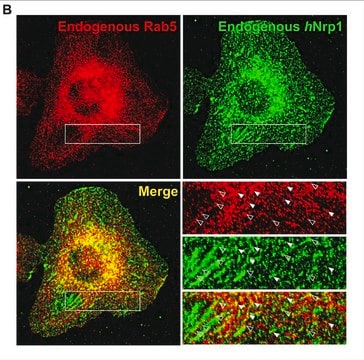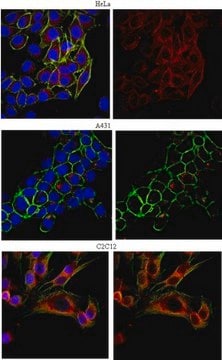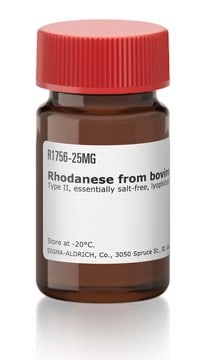R7904
Anti-Rab5 antibody, Mouse monoclonal
clone Rab5-65, purified from hybridoma cell culture
Synonym(s):
Anti-RAS-associated Protein RAB5A
About This Item
Recommended Products
biological source
mouse
Quality Level
conjugate
unconjugated
antibody form
purified immunoglobulin
antibody product type
primary antibodies
clone
Rab5-65, monoclonal
form
buffered aqueous solution
mol wt
~24 kDa
species reactivity
human, cat, bovine, mouse, rat
concentration
~2 mg/mL
technique(s)
immunocytochemistry: 5-10 μg/mL using HeLa cells or NIH-3T3 or NRK
indirect ELISA: suitable
microarray: suitable
western blot: suitable
isotype
IgG3
UniProt accession no.
shipped in
dry ice
storage temp.
−20°C
target post-translational modification
unmodified
Gene Information
human ... RAB5A(5868)
mouse ... Rab5a(271457)
rat ... Rab5a(64633)
General description
Immunogen
Application
- enzyme linked immunosorbent assay (ELISA)
- immunocytochemistry
- co-immunoprecipitation assay
- western blotting
- immunofluorescence
Biochem/physiol Actions
Physical form
Disclaimer
Not finding the right product?
Try our Product Selector Tool.
recommended
related product
Storage Class Code
10 - Combustible liquids
WGK
WGK 3
Flash Point(F)
Not applicable
Flash Point(C)
Not applicable
Personal Protective Equipment
Certificates of Analysis (COA)
Search for Certificates of Analysis (COA) by entering the products Lot/Batch Number. Lot and Batch Numbers can be found on a product’s label following the words ‘Lot’ or ‘Batch’.
Already Own This Product?
Find documentation for the products that you have recently purchased in the Document Library.
Our team of scientists has experience in all areas of research including Life Science, Material Science, Chemical Synthesis, Chromatography, Analytical and many others.
Contact Technical Service








